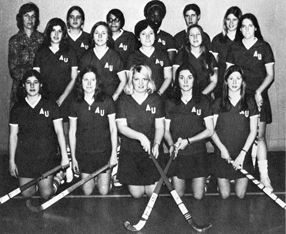
As June 23 neared and the 50th anniversary of Title IX’s passage approached, Barb Reimann’s thoughts drifted to the contents of the watershed civil rights legislation. Nowhere in its 37 words prohibiting discrimination on the basis of sex in federally funded education programs and activities do “sports” or “athletics” appear, but Title IX is indelibly linked to the advancement of women in both.
“Athletics was kind of a side effect,” says Reimann, who spent 30 years as a field hockey coach, athletics administrator, and professor at AU. She nevertheless made it a lasting one, working before, during, and after the passage of Title IX to advocate for generations of female student-athletes.
When she arrived at AU in 1967, Reimann wore many hats to keep afloat an underfunded field hockey program. She transported sticks in her car, washed kilts, and purchased oranges to provide players a half-time energy boost.
In the early ’70s, Reimann continued to fight to provide opportunities for young women in the classroom and in athletic competition. She attended demonstrations downtown in support of Title IX. She played an integral role—as part of a consortium of women’s physical education instructors—in AU becoming a charter member of the Eastern Association for Intercollegiate Athletics for Women in February 1972. (She was also elected the regional governing body’s first treasurer.) Reimann pitched in at “think tank meetings” to help the Association for Intercollegiate Athletics for Women develop positions on equal opportunity guidelines. She coached AU’s inaugural women’s postseason game in 1975 and, a year later, signed the university’s first female scholarship student-athlete: forward Leslie Evans.
And when it came to securing equal experiences for male and female athletes—from banquets to class rings to adequate water on the Massachusetts Avenue field grass—“I got to be a pain in the neck,” says Reimann, who also consulted with other AU departments’ search committees on Title IX compliance. “If I hadn’t said anything and pushed for it, then it wouldn’t have happened.”
After 20 years and 111 wins at the helm of the field hockey program, Reimann became an assistant athletic director, handling department compliance matters and launching the academic support program for AU student-athletes. She retired in 1997, earning induction into AU’s Stafford H. “Pop” Cassell Hall of Fame in 2001.
In the 1940s and ’50s, long before Title IX, Reimann played field hockey and basketball at Frankford High School in northeast Philadelphia. She looks back fondly on the experience, which was competitive and enjoyable—but far from equitable. (She and her teammates were allowed to use the gym one day a week to the boys’ four and walked six blocks to practice at the junior high school on the other days.)
As the weight rooms at the 2021 NCAA men’s and women’s basketball tournaments suggested, those disparities are still painfully obvious at times. But every year that she attends another women’s Final Four—enjoying the game from a sold-out arena or one nearly so—Reimann thinks: “It’s amazing. We all have much more now than we ever had.”